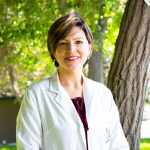Evidence-based practice (EBP) is an approach to healthcare that uses recent research results to improve the delivery of healthcare and patient outcomes. Research has found that EBP decreases geographical differences in care and cuts costs. Nurses practicing EBP have been found to experience less stress and have greater overall job satisfaction.
Nurses deliver this high-quality patient care based on evidence. Research in the field provides evidence that can be used to improve patient care and is essential to the nursing profession. All nurses are required to keep up to date with healthcare research. Nursing staff can even study for postgraduate qualifications, leading to work in research positions.
Master of Science in Nursing (MSN)
Becoming a nurse researcher requires an MSN at a minimum. This degree program will teach more advanced research methods, how to conduct research and how to analyze and apply evidence-based studies. The program will also cover high-level practical nursing and leadership.
Applicants should have at least two years of work history as a licensed nurse. An MSN typically takes two years of full-time study, although part-time students can usually complete the program in four years. There are online MSN programs that suit those working or with other responsibilities. The advantage of working while studying is having the opportunity to apply what is learned in the real world.
Doctor of Nursing Practice (DNP)
A DNP is the highest degree in nursing practice. For admittance to the program, an MSN is required, often alongside having had work published in an academic journal or other contributions to nursing literature or research. Some nurse researchers have a Ph.D., but many employers employ DNPs in nurse researcher positions.
Most DNP programs focus on research methods, evidence-based practice, clinical hours, analytics and informatics, financial and cost-effectiveness analysis and evaluation. Students will conduct original research, act as lead authors on academic publications, analyze existing research and learn how to apply research to change clinical practice.
Most DNPs take two years full-time or up to four years part-time to complete and there are online programs. It is possible to enroll in a combined MSN-DNP program which takes about three years. Nurses with a DNP degree can apply for many research roles.
Other doctorate degree programs
The Doctor of Philosophy (Ph.D.) is the highest degree awarded in many academic fields. It generally requires a research project and dissertation and qualifies the holder as an expert in their chosen field. Typically, applicants require a 2:1 or above bachelor’s degree and a merit-level or above master’s degree.
Nursing Ph.D. courses explore nursing in great detail, and students produce coursework regularly to demonstrate their developing aptitude and knowledge. Students assemble an original research-based thesis throughout their study. Their final year involves completing and presenting this research.
This degree can be completed online and is an intense academic commitment that demands time. It can take three or four years full-time or up to eight years part-time. There are numerous roles for a Ph.D. graduate, including nursing lecturer and clinical researcher.
Marymount University offers an online Doctor of Education in Educational Leadership & Organizational Innovation. The online Ed.D. program includes social justice, equity and ethics courses. Students strengthen their leadership skills and learn how to drive positive change in the community.
Certification
Most research nurses are certified as either a clinical research coordinator (CRC) or a certified clinical research associate (CCRA). Both of these call for at least 3,000 hours of work in clinical research or a combination of academic study and experience. Certification is not a legal requirement, but it is required by many employers.
Research project
Experiences with COVID-19 is a research project conducted in 2022. Millions of Americans have tested positive for COVID-19, and the study’s objective was to find out about the lived experience, the length and severity of symptoms, the coping mechanisms used and the issues people faced when accessing healthcare.
This was a qualitative study with semi-structured interviews using a pre-determined set of open questions which allowed the interviewer to explore specific themes or responses further. They interviewed 45 people aged 18 and over living in the United States who tested positive for COVID-19. Interviews took place online. Findings were interpreted to identify themes for analysis and conclusions.
Participants were asked what it was like to have COVID-19. Here are two responses:
- “COVID is scary. It is like nothing you have ever had before; it takes you over, your whole mind and body. I have had flu, colds and pneumonia, this was different.”
- “I was so tired I could hardly move. I had brain fog and fuzzy thinking; I could not read or make sense of anything. I tried to read for a week.”
Participants were asked about accessing healthcare. Here is a sample of responses:
- “After I was discharged from hospital, I rang my doctor’s office and told them I had been in hospital with COVID and pneumonia. I asked to see a doctor, but they said I could only have a televisit. I am like, what is the point? If you are not going to let me come in and listen to my breathing and check me out. How are you going to do that over the phone? That really annoyed me. Nowadays if you’re sick, you can’t see a doctor.”
- “I went to the ER and I felt like they treated me differently, they were not customer service friendly, because I had COVID they were trying to keep their distance.”
- “I went to the ER and the staff were awesome. My doctor told them I was coming. They took me into a private room for COVID patients; they were great.”
Some individuals reported a wide range of clinical symptoms with varied levels of severity, whereas others reported minimal or no symptoms. Several people in their 20s and 30s had difficulty fighting the virus and its lingering effects. However, there were people over 50 years of age who had little or no symptoms. This shows the importance of everyone seeking healthcare early when diagnosed.
Telemedicine provided healthcare access but was inadequate for those needing reassurance and in-person assessments. Individuals also experienced various emotions when they tested positive for COVID-19. Many were scared and found it a traumatic experience. This fear is an important clinical finding that should be considered by healthcare providers when treating acute and chronic COVID-19 patients. While significant quantitative research was done on the science behind the disease, studies like this one pointed out where healthcare workers could improve the experience for patients while providing services. These studies highlight the importance of patient care and effective nursing practice.
Nursing research jobs
The research field is an expanding area of healthcare that offers various career opportunities. Research nurses can begin their careers giving direct patient care and gain the knowledge and skills needed to work in clinical research nursing.
A clinical research nurse delivers patient care in clinical trials, which can involve nursing duties such as administering medications and treatments, such as radiotherapy, and collecting data to determine the treatment’s effectiveness. They also ensure adherence to safety procedures throughout the trial.
A research nurse practitioner is a registered nurse who has a master’s degree and additional certification and licensure as an advanced practice registered nurse (APRN). They have more seniority in these positions, though they are also responsible for patient care in clinical trials, performing nursing duties such as administering treatments and collecting data. They also serve as educators for participants and provide expertise in designing the trials, analyzing data and adhering to safety regulations.
A clinical research coordinator ensures that a clinical trial is running correctly. They assign tasks to nursing teams, organize data collection and follow up on safety procedures. They will also educate and prepare participants for the trial and monitor and report trial progress and outcomes.
A research nurse supervisor manages the day-to-day running of a clinical trial. They work with the team to ensure the trial is progressing as planned. They often determine which patients participate in a study, evaluate participant progress and ensure compliance with safety procedures.
The principal investigator has overall responsibility for managing the clinical trial. They oversee the preparation, conduct and administration of the trial and ensure compliance with regulations. They will typically serve on the board that governs the trial and oversee the work of all research nurses. They are responsible for objectives being achieved and managing budgets and timelines. They can train staff, evaluate participant safety data and decide which treatments to test in future trials.
Nursing research
Research helps nurses determine effective best practices and improve patient care. Nurses must understand the importance of research as new information is constantly emerging. Research studies can correct old misconceptions, introduce new treatment procedures and develop new methodologies in nursing – all of which leads to better patient outcomes. Undergraduate students learn to understand and critique nursing research.
Nurse researchers work in the medical field, liaising between researchers and participating patients. They work in hospitals, medical clinics, research laboratories, academic medical centers, and pharmaceutical and medical device companies.
Studies conducted by nurse researchers are looking for new and better ways to:
- Deliver healthcare services more effectively.
- Improve the quality of life for patients with chronic illnesses.
- Support patients to make healthy choices about diet, exercise and lifestyle.
- Ensure the safety of patients.
- Provide quality end-of-life care.
A medical study may involve testing new drugs and biological products, and the research nurse will ensure that the drugs are delivered safely to the participants. The nurse will monitor side effects and watch for complications and document all relevant information.
Research nurses may also be involved in clinical trials that test healthcare systems. For example, a new surgery procedure could be evaluated to determine its effectiveness. The nurse would monitor patients following surgery and collect relevant data for evaluation.
Nurses can conduct original research on improving nursing practice, manage research studies or care for patients participating in research studies. The majority of nurse researchers still work with patients. Nurse researchers should have nursing knowledge and skills, strong analytical abilities, be able to analyze data and identify patterns or unusual results and communicate effectively with academics and patients.
Research is essential to the nursing profession and contributes to continuous advancements in nursing care. The principal goal for nurses is to advocate for patients and provide high-quality care based on evidence acquired through research. Nursing research greatly influences current and prospective nursing practice, making it a critical part of the education process.
Nursing research studies cover a wide range of topics. Examples include:
- Dementia behavior in the elderly.
- End-of-life care in complex organizations, such as prisons.
- Heart disease in older women.
- Chronic illness and long-term care.
- HIV/Aids.
- Effects of stress, age, gender, hormones and other factors on immunity, inflammation and health.
- Genetic factors of diabetes in children.
Researchers make discoveries, and this means the practice of nursing continues to change. Students learn information that is soon outdated, so keeping up with new developments helps nurses improve their performance. Research also helps in responding to changes in patient populations, the healthcare environment and government regulations.
EBP requires using research results to make medical decisions and perform care. Nurses must relate the results of research to their work. Best practice in the field is established by published data that is accepted by the profession. Results must be free of bias, justifiable and duplicable under the same research conditions. The standards for research are high because published results influence nursing practice.
When evaluating published research, there are four critical areas to consider:
- Validity: Is the study accurate?
- Reliability: Is the measured result consistent?
- Relevance: Is the study applicable to patient care?
- Outcome: What were the conclusions?
Nurses need to understand and evaluate research papers in order to decide what information applies to their nursing practice. They need research to advance in their field, stay updated and offer better patient care. Nursing schools teach these skills so nurses can advance in their careers.
Conclusion
Research is pivotal in nursing and allows nurses to use evidence-based practice. Nurses must keep up to date with nursing research to provide high-quality patient care. Before working as a researcher, nurses need to study for postgraduate qualifications. Nurse researchers can combine practical experience with clinical skills and knowledge. Research study results can lead to improved healthcare practice and patient outcomes.
I am a 26 year old young and witty girl, who simply loves to write and be around her friends. I am the one who believes in filling the heart of her readers with love, passion and contentment.







